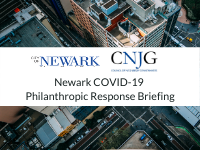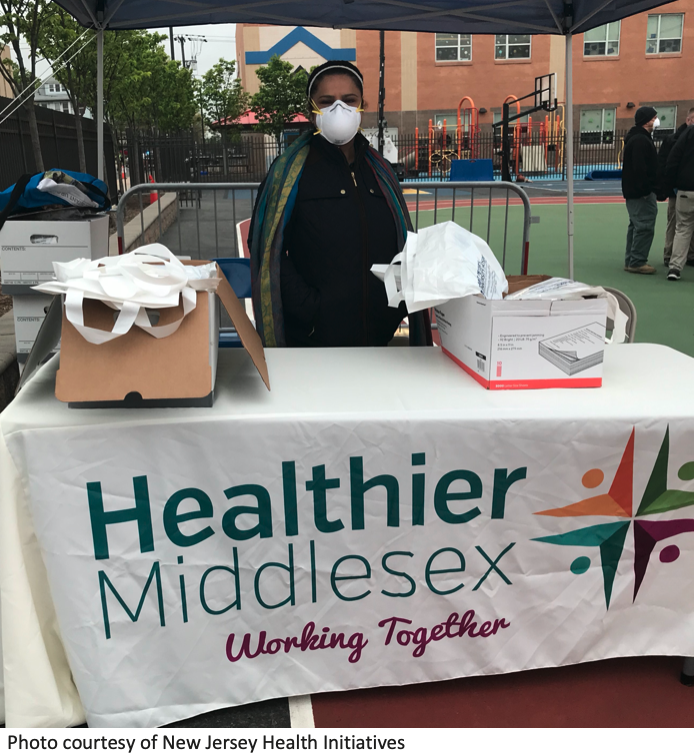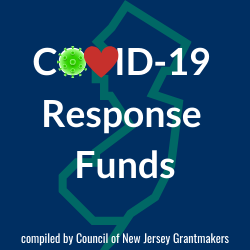Site Search
- resource provided by the Forum Network Knowledgebase.
Search Tip: Search with " " to find exact matches.
A CNJG corporate member asked for help with the scenario in which a corporate policy of not supporting religious organizations in their grantmaking, causes problems helping during a disaster in an urban or rural area, when the program that is delivering the disaster relief is based within a church. They want to work with those programs (a church serves as the program’s fiscal sponsor) who support efforts for hunger, homelessness, substance abuse recovery, racial equity, etc. as long as they do not discriminate and do no limit it to their own congregations. The request for policy samples to work around this religious organization hurdle as long as there is no discrimination or funding the actual church’s worship, was compelled by CNJG staff and is listed here.
Food is essential. But how often do you consider where your food comes from?This issue of What Funders Need to Know from the Washington Regional Association of Grantmakers explores the stages of the food system, from production all the way to disposal. Why is this important to philanthropy?
Because hunger, food insecurity, nutrition-related chronic disease, the health of resource lands and waterways, wages, and equal opportunity in the food economy all converge in our regional food system.
The Ford Institute for Community Building, a program of The Ford Family Foundation, works to help community leaders learn how to implement local solutions based on principles of effective community building. This paper describes the development and work of the The Ford Institute for Community Building.
What are the biggest needs and challenges New Jersey communities face as result of the pandemic?
- It starts with the basics: food and shelter, medical equipment such as masks for long-term care facilities, and digital access for remote education and medical screenings. For many immigrants and the undocumented community, this challenge is even greater.
- Parents of school-age children need support in navigating remote education and childcare challenges -- and balancing them with employment needs.
- People who’ve lost their jobs need to know how to find the right support services, and those services need to be accessible -- no technology or language barriers.
- Schools are having to re-imagine how they can open in the fall – if they can – with appropriate social distancing that requires changes to infrastructure and schedules.
- Organizations need support to retrofit their public spaces so they can serve the public safely.
How is CNJG leading efforts to prepare the philanthropic sector for an effective response?
- CNJG helped create the Disaster Philanthropy Playbook after Superstorm Sandy in 2012 and uses many of the lessons learned then to inform response and recovery plans for COVID.
- Almost immediately, CNJG began providing funder briefings, webinars, and other forms of information to the philanthropic community.
- With our members, CNJG created the COVID-19 Funder Learning Community for the numerous response funds that are serving New Jersey was established to:
- Get timely updates on the latest pandemic developments
- Share information about what services and help are needed most -- and where
- Explore potential strategies for effective grantmaking that matches resources to needs and avoids duplication
- Learn best practices from each other
How is the pandemic affecting New Jersey nonprofits?
- The COVID-19 crisis is having a significant and alarming financial and programmatic impact on the nonprofits relied on to care for those in need. According to the Center for Non-Profits Rapid Response Survey:
- 83% cancelled programs or events and correspondingly lost revenue
- 77% have budgetary implications related to strains on the economy
- 52% have increased demands for services
- 40% experienced a disruption in supplies or services provided by partners
- 37% have an increase in or sustained absences of staff and volunteers
- 31% have had layoffs or furloughs
- Many nonprofits lack the digital infrastructure needed to employees’ and volunteers’ sudden switch to remote work and many volunteers who do important work are no longer available.
How is New Jersey’s philanthropic sector responding to the needs of nonprofits and the people they serve?
- Many funders have streamlined the grantmaking process so nonprofits can either refocus grants or receive new funding expeditiously to provide immediate relief for those facing the most pressing situations.
- Many funders are reducing what they ask of nonprofit partners – for instance postponing reporting requirements, deferring site visits, and eliminating other demands on their time so they can focus efforts during this challenging time.
- Some are providing low- or no-interest loans or outright grants to small businesses and nonprofits to retrofit their facilities to keep essential workers and the people they serve safe.
- Several community foundations and other nonprofits have established NJ COVID-19 relief funds that make it safe and convenient for donors to give, and that direct resources to where they are needed most.
- The sector is committed to grounding its work in the Center for Disaster Philanthropy's key principles of grantmaking:
- Resilience, to improve communities holistically and make them stronger than before a disaster.
- Equity, to take historical injustices into account and inform investments.
- Sustainability, to take into account a long-term view and factor in uncertainty.
- Civic participation that equips and empowers those often left out to influence what happens in their communities.
How is CNJG responding to longstanding equity issues that the pandemic exposes and makes worse?
- Together with the Center for Non-profits in New Jersey, we put out a statement on behalf of the state’s philanthropic and nonprofit sectors, urging everyone to speak out against racism and discrimination in all forms.
- CNJG established a Racial Equity Task Force to eliminate any structural racism in New Jersey’s philanthropic community.
- Most of the larger COVID funds engaged community-based practitioners to assist in decision-making on grant awards, and CNJG is creating a local advisory group for the Learning Community.
What steps are being taken to make sure grants aren’t duplicative and that money is going where it’s needed most?
- CNJG encourages the philanthropic sector to use a shared mapping tool that shows how much money is being awarded and where. This tool helps grantmakers make informed decisions and helps to eliminate gaps in historically under-funded communities.
- The COVID-19 Funder Learning Community is a vehicle for building relationships and sharing information about what each funds is doing to support relief and recovery across the state.
What’s the best way for people to donate money for relief and recovery?
You can find a list of these New Jersey Relief and Recovery funds and their contact info here.
This weekly conference call series welcomed New Jersey-based grantmakers along with national funders and provided an opportunity for grantmakers to hear from a wide range of experts in the field of disaster philanthropy. This series started on September 9, 2013 and concluded on November 4, 2013. The written summaries of each recording are listed below.
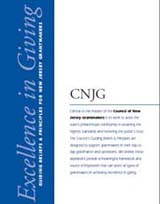
This includes insights and tips related to board governance, legal compliance, grantee communications, fiscal responsibility, public disclosure, and many other key areas of foundation governance and operations. It is intended to serve as a practical resource to assist foundations in their grantmaking.
This tool for unstaffed foundations includes an accountability self-assessment and a legal checklist. It is divided into nine topic sections, each of which is divided into three levels, which can help foundations tailor the tool to meet their specific interests and needs. Also included are an Excel spreadsheet to help tabulate responses, an extensive accountability resource list, and a glossary of key words and concepts used in the tool.
This publication from Grantmakers for Effective Organizations offers a framework for thinking about how to measure progress and results in place-based and community change initiatives.
New Jersey’s philanthropic and nonprofit sectors are in the forefront of helping communities respond and recover from the worst health and economic crisis of our lifetime.
On these pages, CNJG offers resources to help our members get the knowledge and information needed to be the most effective possible grantmakers.
CNJG is helping to track New Jersey philanthropy’s pandemic response through our “Get on the Map” campaign partnership with Candid, which launched a coronavirus map in response to funders’ requests. As you can see, the information collected is not complete, so please help. Visit our Share Your Giving Data webpage for information about how to share your COVID-19 grants data.
Sharing information with other funders is critical to informing philanthropy in the weeks and months ahead. Knowing where money is going, and how — and having the latest information — facilitates thoughtful collaboration and decision-making in times of crisis.
CNJG Response
Communications
CNJG created a Coronavirus Response webpage and listserve for the COVID-19 Response
Email to Members: NJ Philanthropic Response to COVID-19 (March 13)
Email to Members: Working Remotely Ensuring Service to Members (March 17)
CNJG participated in: Creative NJ Statewide Conversations - NJ’s Philanthropic Response (April 8)
CNJG Member Query: COVID-19 Rapid Response Funds
CNJG asked their members to share your grants data to update the coronavirus map and track philanthropy’s response to the coronavirus pandemic.
CNJG Member Query: Grant Approval Templates Related to COVID-19
CNJG signed onto letter calling on philanthropy to act to curb bias attacks as virus spreads.
CNJG created a FAQ page about philanthropy’s COVID response.
NJ COVID-19 Response and Recovery Funds Learning Community
The NJ COVID-19 Response and Recovery Funds Learning Community helps grantmakers involved in special purpose COVID 19 funds get timely updates on what is happening on the ground, share information about what and where services and help are needed most, and explore strategies for the most effective grantmaking investments. Designed around the Center for Disaster Philanthropy's key principles of grantmaking -- resilience, equity, sustainability, and civic participation -- the Learning Community is committed to holding the difficult conversations about how philanthropy can best respond to community needs and help those who need it most.
COVID-19 Funders Briefings
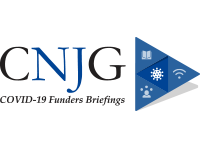 CNJG hosts regular briefings where funders hear from government officials, disaster recovery and health experts, nonprofit leaders, funders, and other stakeholders dealing with the COVID-19 pandemic. The briefings provide an opportunity to share how colleagues are changing grantmaking practices for rapid response, learn about new policies and government actions, and connect with local leaders who work with people whose financial, physical, and mental health suffers due to COVID-19. Series I topics included food insecurity, mapping response funding, racial health disparities, federal and state policy, and updates from New Jersey response funds and Rapid Response Surveys, completed in partnership with the Center for Non-Profits in March, April, and July 2020.
CNJG hosts regular briefings where funders hear from government officials, disaster recovery and health experts, nonprofit leaders, funders, and other stakeholders dealing with the COVID-19 pandemic. The briefings provide an opportunity to share how colleagues are changing grantmaking practices for rapid response, learn about new policies and government actions, and connect with local leaders who work with people whose financial, physical, and mental health suffers due to COVID-19. Series I topics included food insecurity, mapping response funding, racial health disparities, federal and state policy, and updates from New Jersey response funds and Rapid Response Surveys, completed in partnership with the Center for Non-Profits in March, April, and July 2020.
Newark COVID-19 Webinars
CNJG’s Newark Philanthropic Liaison, Kevin Callaghan, organized a series of webinars for our Newark Funders Affinity Group and other funders to know the specific challenges of New Jersey’s largest city responding to the COVID-19 pandemic. Guest speakers included, Mayor Ras Baraka, Newark Public Schools Superintendent Roger Leon, consulting firm McKinsey & Co., and Catherine Wilson, CEO of United Way of Greater Newark.
Affinity and Interest Group COVID-19 Webinars
In order to dig deeper into the impact of the pandemic on certain communities and stay connected during this difficult time, CNJG worked with our affinity group chairs and other members to develop programming that supplemented our COVID-19 Funders Briefing Series and Newark COVID-19 Series. These virtual affinity and interest group meetings were designed for colleagues to update each other on coronavirus response efforts, hear about the greatest needs in their funding area, and share what they have learned.
CNJG Member Actions
News articles showing members philanthropic responses to the coronavirus pandemic which include announcements, emails, blogs, grants given and other resources gathered by and for our members.
New Jersey Focused Response Funds
A list of all of the response funds that foundations and philanthropic organizations have set up to help local communities, residents, non-profits, and businesses throughout New Jersey and news of the grants being awarded by each fund.
PSO, State, and Government Resources
Resources gathered from our colleagues at other philanthropy-serving organizations, state associations of nonprofits, and city, state and federal governments.
State and National COVID-19 News Articles
Some of the top COVID-19 news stories, centrally located for easy access.
CNJG provides this information free to the philanthropic community. If you are not a CNJG member, please join so you can take full advantage of the many benefits of membership and help underwrite the cost of services like this.

